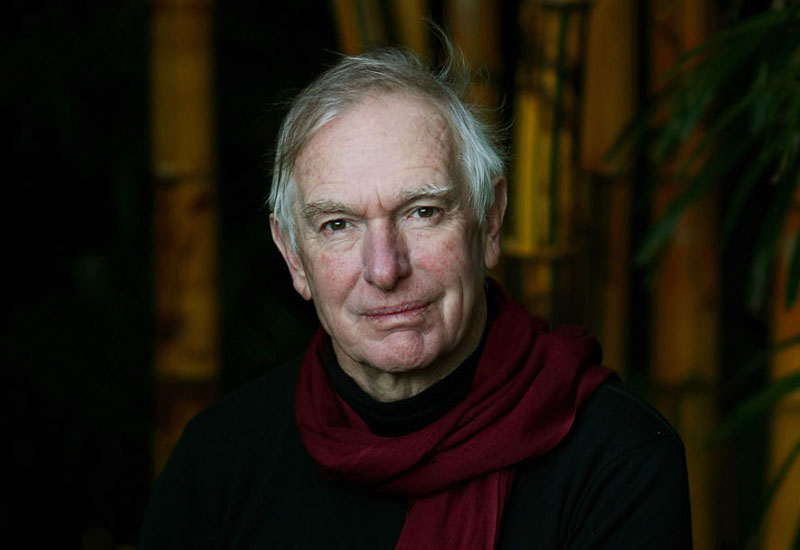Each day during this special week we will be highlighting the filmmakers and actors that Roger championed throughout his career. A table of contents for all of our “Roger’s Favorites” posts can be found here. Below is an entry on director Peter Weir.
When Roger reviewed “Picnic at Hanging Rock” (1975) upon its U.S. release, he spotted great potential in its Aussie director, Peter Weir. Though some viewers had complained that the film lacked a satisfying conclusion, Roger argued that such an ending would’ve made the film, as a whole, much less interesting. “As a tantalizing puzzle, a tease, a suggestion of a forbidden answer just out of earshot, it works hypnotically and very nicely indeed,” Roger wrote in his three-and-a-half star review.
The critic found even more to praise in Weir’s 1983 feature, “The Year of Living Dangerously,” which achieved “one of the best re-creations of an exotic locale” Roger had ever seen in a movie. Awarding the film four stars, Roger hailed it as “a wonderfully complex film about personalities more than events, and we really share the feeling of living in that place, at that time.” He also admired how the director plunged his audience into the story headfirst, rather than “pause for travelogue shots.”
Two years later, Weir directed Harrison Ford to an Oscar nomination in “Witness” (1985), a film that also earned four stars from Roger. Though the picture was billed as a thriller, Roger stressed that the film transcended the boundaries of any single genre—working as a romance, a sociological study and, yes, a thriller that “Hitchcock would’ve been proud to make.” Roger wrote that Weir had “a strong and sure feeling for places, for the land, for the way that people build their self-regard by the way they do their work.” In light of medicare exploitation films that were filling up the multiplexes, Roger said that “Witness” arrived “like a fresh new day.”
The critic was, however, less enthusiastic about Weir’s next efforts, giving “The Mosquito Coast” (1986) and “Dead Poets Society” (1989) two stars apiece. He did recommend Weir’s 1991 romantic comedy, “Green Card,” with a three-star review, praising Weir for “putting a slight spin on some of the obligatory scenes.” Roger also favored Weir’s “Fearless” (1993), for which he wrote one of his most provocative reviews. Though he also awarded the film three stars, he said that the film awakened him to how amazing mankind’s existence truly is, and how easy it can be to take it for granted. “If we ever really fully perceived the cosmic situation we are in, we would drop unconscious, I imagine, from shock,” Roger wrote. “That is a little of what ‘Fearless’ is about.”
Five years later, Weir directed “The Truman Show” (1998), a film that forever altered the public’s image of Jim Carrey as a mere comedian, while eerily foreshadowing the emergence of reality TV. In his four-star review, Roger praised the screenplay by Andrew Niccol, and noted that the underlying ideas in his narrative make the movie “more than just entertainment […] It brings into focus the new values that technology is forcing on humanity. Because we can engineer genetics, because we can telecast real lives—of course we must, right? But are these good things to do? The irony is, the people who will finally answer that question will be the very ones produced by the process.” Roger went on to grant four stars to Weir’s next film, “Master and Commander: The Far Side of the World” (2003), which he hailed as “grand,” “glorious” and “an exuberant sea adventure told with uncommon intelligence.” He compared Weir to David Lean in how he “achieves the epic without losing sight of the human.” And though Roger was less enthusiastic about Weir’s most recent film, “The Way Back” (2011), he noted in his two-and-a-half star review that Weir was clearly “a master filmmaker.”
The same year that “The Truman Show” was released, Roger inducted “Picnic at Hanging Rock” into his Great Movies series. The film, Roger noted, “creates a specific place in your mind; free of plot, lacking any final explanation, it exists as an experience.” He compared the film to Nicolas Roeg’s “Walkabout” (1971), in how it suggests that “aboriginal life cannot be sustained in cities, nor European-based life in nature.” Reflecting on Weir’s body of work, Roger was struck by the recurring theme of outsiders who find themselves in a place where they are unwelcome. “Somewhere at the very bottom of [Weir’s] imagination must lurk the conviction that you’ll be all right if you stay at home, but if you wander into other lands you may find that you have disappeared,” Roger wrote.











